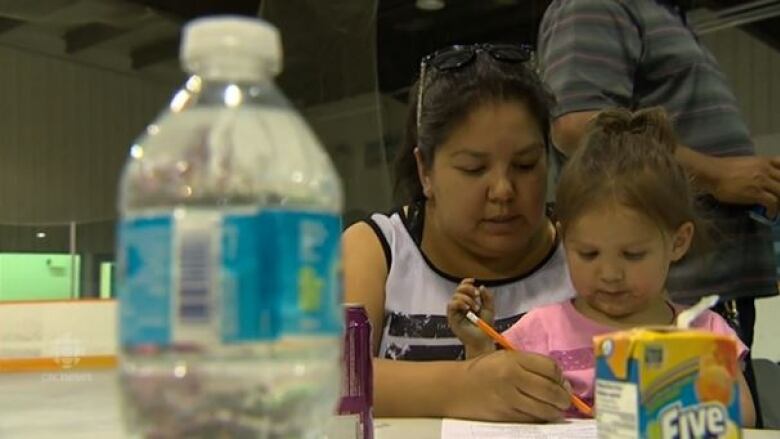Council of Canadians call on federal party leaders to 'end First Nations water crisis'
119 organizations signed open letter, saying 'access to clean, safe drinking water is a right'

The Council of Canadians is spearheading acampaign that calls on the four federal party leaders to "end the drinking water crisis in First Nations communities."
In total, 119 organizations have signed an open letter to Stephen Harper, Justin Trudeau, Thomas Mulcairand Elizabeth May.
"Despite repeated pledges from the federal government to ensure clean drinking water, there are routinely over 100 water advisories in effect in First Nations communities, with some communities living under advisories for over 10 years," the letter reads in part.
The letter demandsa 10-year investment, with$470 million annually,to be put intowater treatment and wastewater systems inFirst Nations.
- Read the full letter here
- Bad water: 'Third World' conditions on First Nations in Canada
- Feds spent $1M on bottled water in First Nation with broken water plant, chief says
- Neskantaga First Nation: 5 people whose daily life revolves around getting clean water
The letter also states thatthere are currently 162 drinking water advisories in 118 First Nation communities,based onHealth Canada's andFirst Nations Health Authority's latest figures.
This is the second time within weeks that there has been acallfor action relating to First Nations water quality.
On Oct.5, the NeskantagaFirst Nation, along with the Chiefs of Ontario, demanded that bad water become an election issue.
Abusive and demoralizing, say advocates
Maude Barlow,the national chairperson with the Council of Canadians, said she's appalled by "the abusive nature that many First Nations are forced to live in."
"These are Third World living conditions.People living in First Nations communities are 90 per cent more likely to not have access to clean water or sanitation than other Canadians," Barlow said.
"You wouldn't ask your neighbour to live like that. You would not ask your kids to live like that. We should not be allowing Canada's First Peoples to live under these conditions."
Barlow saidsince 2008, the federal government has committed only $165 million annually to drinking water and wastewater systems in First Nations,despite the fact it had commissioned a national assessment that found that $4.7 billion over 10 years was needed.
"A bunch of statistics is still numbers on a page, but when you go to a community that doesn'thave clean water coming out of their tap, who don't have proper sewage systems, and have been under a boil water advisory foryears, you begin to see what it does to the people," Barlow said.
"It demoralizes them and you see how hard it is to raise children [in that environment]."
It's why her organization is hard at work trying to address the crisis.In the past two months, for example, the Council of Canadians hasbeen recruiting others in an effort to make First Nations water equality an election issue.
18 years of boil water advisories
Among the signaturesare three Ontario reserves: Shoal Lake 40 First Nation, the Chippewas of the Thames, and Kitchenuhmaykoosib Inninuwug.
- Shoal Lake 40 to make clean water case before United Nations
- Shoal Lake 40 and Winnipeg's drinking water: What's at stake?
- Hundreds march in support of Shoal Lake Freedom Road
Erwin Redsky is the chief of Shoal Lake 40. Although his community is located right next to the source of Winnipeg's water supply, it remainson a boil water advisory.
In a statement,Redsky saidCanada continues to ignore the problem.
"Our leaders have long sought an end to a century of forced isolation," he said.
"The very water that blocks our safe passage is diverted to serve Winnipeg's drinking fountains and water slides while our people suffer under an 18-year boil water advisory. How can there be any reconciliation in a country where this kind of inequality is acceptable?"
The Assembly of First Nations, the Union of B.C. Indian Chiefsand the Grand Council of Treaty 3 have also signed the letter.
No water service in 2,000 First Nations homes
The David Suzuki Foundation, Amnesty International, the Public Service Alliance of Canada, theCanadian Federation of Students and the Polaris Institute are among the other notable organizations that have also signed the openletter.
Amnesty International highlights the fact that there are almost 2,000 First Nations homes in the country that do not have any water service at all.
"This crisis is the directresult of years of federalunderfundingof on-reserve drinking water systems," said Amnesty's secretary general,AlexNeve.
"My Canada includes clean drinking water for First Nations communities," said Dr. Faisal Moola, the David Suzuki Foundation's director general for Ontario and northern Canada.
"Clean drinking water is a human right and must be a priority for any government poised to lead this country."
In early October, Trudeau addressed the situation on the campaign trail. He said he would end boil water advisories in First Nations within fiveyearsif his party is elected to government.
Last week,Mulcairpromised $375 million over four yearsfor critical infrastructure in indigenous communities.
(PDF KB)
(Text KB)CBC is not responsible for 3rd party content












_(720p).jpg)


 OFFICIAL HD MUSIC VIDEO.jpg)
.jpg)



























































































